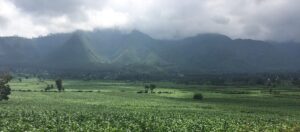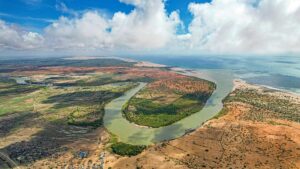How much water does your weekly shop cost?
Can we blame it all on asparagus? What is a water-wise diet? How inland fisheries play a role in improved...
Can we blame it all on asparagus? What is a water-wise diet? How inland fisheries play a role in improved biodiversity? These are some of the many food-related topics up for discussion at this year’s World Water Week.
Questions on food security are starting to climb up the international agenda as governments are becoming more aware of the enormous challenges they face. Not only is the global population expected to grow by two billion in the coming 35 years, but climate change and degraded ecosystems will make agriculture difficult or impossible in parts of the world.
Subsistence farmers already lead insecure lives, and even greater risk of crop failure and hunger lies ahead. Climate change is expected to bring an ever-growing number of droughts and floods, as well as increasingly unpredictable rainfall patterns, the consequences of which can be devastating for farmers.
The daunting reality faced by affected communities will be explored in several World Water Week sessions, including: Leaving no one behind – the World Water Development report.
New problems demand innovative solutions. Latest research indicates that small-scale irrigation and a focus on nutrition can boost productivity and food security, which will be discussed during the session: The multiple bridges connecting the water-nutrition divide: What’s new?
Droughts and their devastating consequences will be addressed during: A big push for drought resilience – can it include all? where it is argued that better drought monitoring and early-warning systems, coupled with adaptation measures based on indigenous knowledge, could substantially reduce the risk of droughts. The urgency of such debate cannot be overemphasized since droughts are considered to be even more destructive to communities than floods or wildfires, in part because they are more linked to rising levels of conflict, something that is also discussed in sessions such as Climate security – moving towards reduced insecurity.
In total, 31 World Water Week sessions are dedicated to agriculture, which is accountable for 70 per cent of freshwater withdrawals.
The global shift to more water intensive food habits will also be highlighted during the Week. The consequences are quite dramatic since large parts of the world has started eating more meat and cheese, which generally require more water for their production. To reverse the trend of increasingly water-intense diets, the first step is awareness: using the concept of water footprints, it can be calculated how much water is required for different kinds of food.
Certain fruits and vegetables are especially water intensive and their cultivation in water scarce areas can result in the local population and nature will be denied access to the water they need. Where does the responsibility lie? In the hands of global food retailers or the wallets of consumers readily buying imported food? That question will be up for discussion during: Is asparagus to blame? A supply-chain review, where a case study concerning asparagus cultivation in Peru will be explored.
The role of inland fisheries has to play will be discussed here: Inland fisheries, freshwater governance and the 2030 Agenda, with the focus lying on fish as an ecosystem service that should be protected by good freshwater governance.
These sessions and many more will be taking place during World Water Week, check out the programme and join the conversation.
[button type=”normal” target=”_blank” rel=”noopener noreferrer” text=”Full Programme” link=”https://programme.worldwaterweek.org/Schedule” background_color=”#6ccacd”]
Find out more about our sessions!
[button type=”normal” target=”_blank” rel=”noopener noreferrer” text=”Full Programme” link=”https://programme.worldwaterweek.org/Schedule” background_color=”#6ccacd”]








